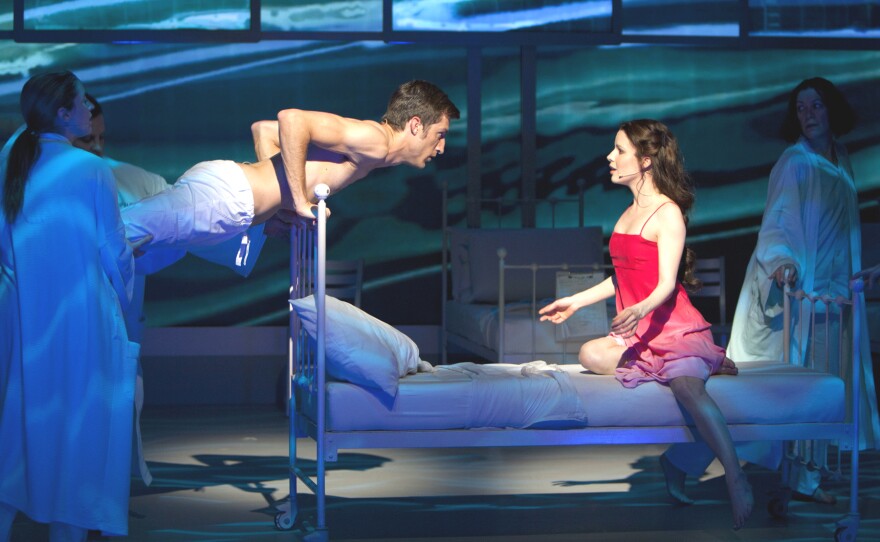Valerie Vigoda and Brendan Milburn seriously have that fairy-tale thing going on. Two of the three members of the theatrical power-pop trio GrooveLily, the married musicians/writers are in the midst of a “happily ever” present. Their latest success, a musical adaptation of a fairytale, “Sleeping Beauty Wakes,” is a hit at the La Jolla Playhouse.
GrooveLily, which started in New York City in 1994 as the “Valerie Vigoda Band” is now a bi-coastal trio, blending classical, jazz and rock, featuring Vigoda and Milburn, who live with their 5-year-old son Mose in Los Angeles, and drummer and vocalist Gene Lewin, who lives with his wife and children in New Jersey. Vigoda, a classically trained musician and the granddaughter of one of Eastern Europe’s great cantors, performs vocals and plays an electric six-string fretted violin called a Viper; Milburn plays keyboards and sings too.
Milburn got his MFA from New York University in Musical Theatre Writing. He wrote his first musical in high school and several more in college, but when he “fell head over heels in love with this beautiful wild electric violin player,” he turned his talents to arranging and producing records. When they married, he gave up theatre aspirations for a shared dream: “We wanted to be famous rock stars.”
For a decade, GrooveLily toured the country, performing 150 shows a year at rock concerts, folk festivals and on the college circuit. The indie rock/pop trio met with success, but as Milburn says, “not enough,” when their lives took an unexpected turn. Life on the road as traveling musicians was exhausting, and they wondered how they could start their own family with their nomadic lifestyle. They remember the date everything changed: October 3, 2004.
"Sleeping Beauty Wakes," which they co-wrote with Tony-Award winning Rachel Sheinkin, is a reimagining of the old fairytale, with a few twists: the Prince’s kiss does not stir Beauty, who oversleeps for 900 years and wakes up in a sleep disorder clinic. It came as a result of their first musical, “Striking 12” which was also based on a fairytale. Not Cinderella’s, but rather “The Little Match Girl,” which Milburn describes as “a modern, fractured adaptation of the most depressing story ever written in Danish.”
Deaf West Theatre in Los Angeles saw the show and commissioned them to write another musical based on a fairytale. Rachel Sheinkin suggested Sleeping Beauty and they saw how it intersected with their own lives. “The original story begins with the King and the Queen who have everything they ever wanted except the one thing they want most of all: a child. We latched onto this story from the perspective of our own potential—and then actual—parenthood,” Vigoda explains. When Mose developed a potentially fatal allergy to peanuts, they understood the story at another level, the desire to protect their beloved child from the danger that the prick of the spindle represents.
GrooveLily still performs about ten times a year in what Vigoda terms “stripped down concerts” which are spontaneous and fun “without being tied to a tech cue.”
“Our fans miss what we used to be,” she admits, but Milburn adds, “We are gathering new ones.” Indeed they are. With the glorious reviews from the show’s first production at the McCarter Theatre, and now the newly revised La Jolla Playhouse production, producers are coming forward, and their hopes soar for a Broadway production.
“Sleeping Beauty Wakes” continues at the La Jolla Playhouse until August 28.





